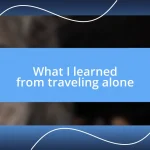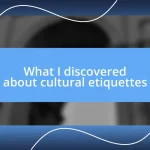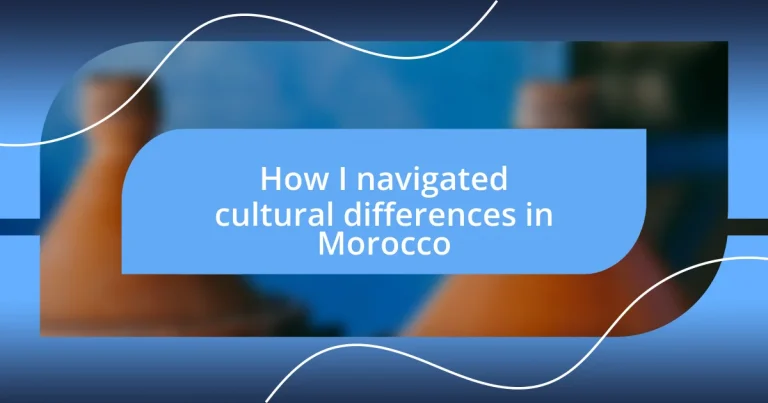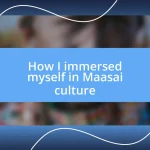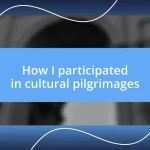Key takeaways:
- Familial bonds and hospitality are central in Moroccan culture, exemplified by sharing meals and traditions like Eid al-Fitr, which emphasize community connection.
- Effective communication involves not just language, but also body language, patience, and humor, fostering deeper interactions with locals.
- Building relationships in Morocco is grounded in genuine hospitality and trust, often strengthened through shared experiences and open vulnerability.
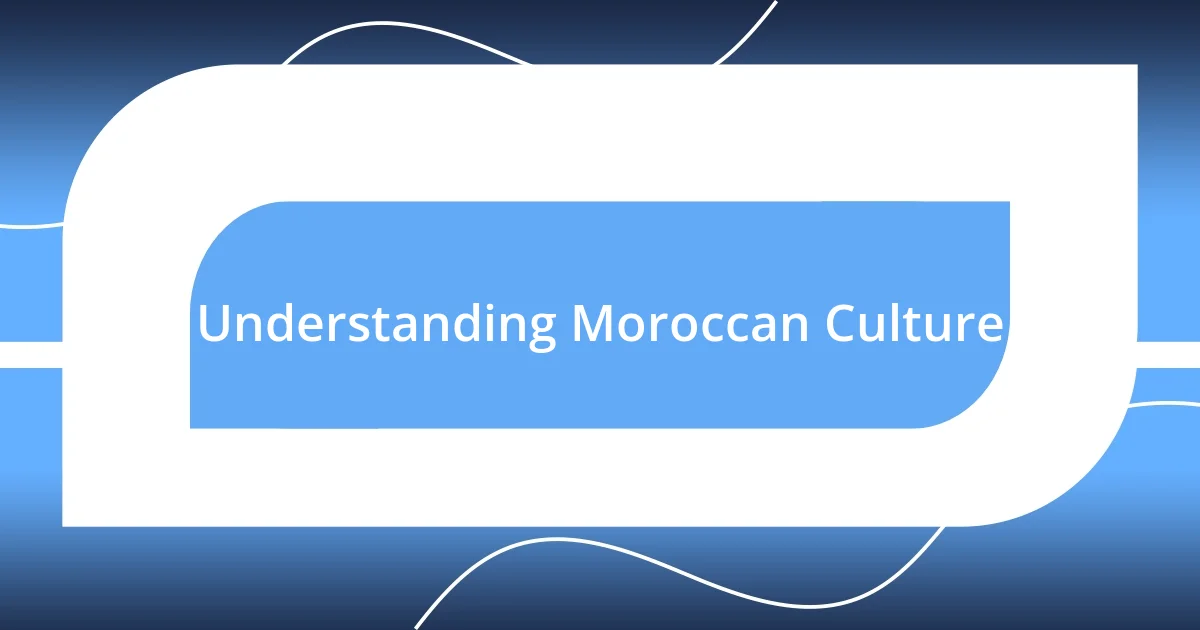
Understanding Moroccan Culture
Moroccan culture is a beautiful tapestry woven from its rich history, diverse influences, and regional customs. During my time there, I vividly remember wandering through the vibrant souks of Marrakech. The colors, scents, and sounds were overwhelmingly stimulating. How can one not be captivated by the thrilling energy that seems to pulse through every corner of the bustling markets?
One aspect that struck me deeply was the significance of familial bonds and hospitality in Moroccan society. On one unforgettable evening, I was invited to share a meal with a local family. They welcomed me with open arms, demonstrating an almost palpable warmth that made me feel like a part of their world, albeit briefly. I realized then that in Morocco, sharing food goes beyond nourishment; it’s an unspoken bond, a way of building connections.
Traditions play a crucial role in everyday life, often guiding the rhythm of their days. I observed how festivities like Eid al-Fitr are not just holidays but deeply revered times for reflection and familial gatherings. It made me ponder: How many cultures place such emphasis on shared moments of joy? In Morocco, every celebration feels like a reminder of the importance of community, a value that resonates with so many of us, no matter where we come from.
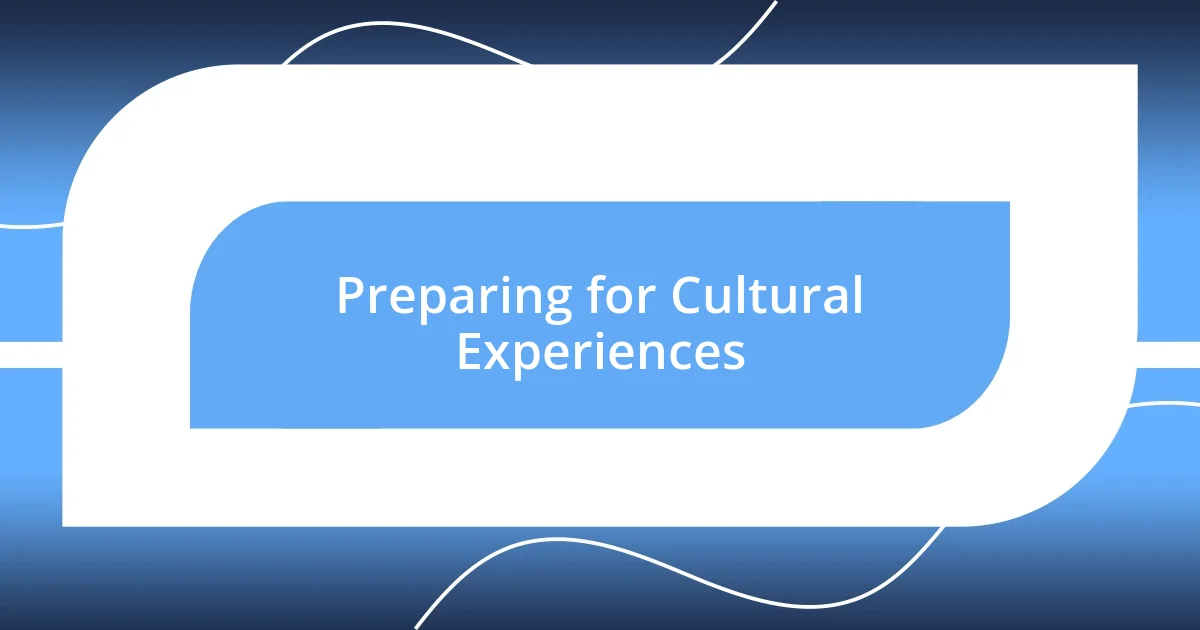
Preparing for Cultural Experiences
Preparing for cultural experiences in Morocco requires a blend of research and open-mindedness. I remember the weeks leading up to my trip, poring over blog posts and travel guides, but nothing prepared me for the actual sensory overload that awaited. Understanding basic phrases in Arabic or Berber, for instance, made interactions more genuine and heartfelt. It’s amazing how a simple greeting can break down barriers and pave the way for warm exchanges.
Here are a few practical tips I found effective while preparing for my journey:
- Learn basic Arabic or Berber phrases: “Salam” (hello) and “Shukran” (thank you) go a long way.
- Research local customs: Knowing when to greet with a handshake or a kiss on the cheek can enhance your interactions.
- Dress appropriately: Respecting cultural norms, like modest clothing, helps in gaining acceptance and respect.
- Try to understand dining etiquette: For example, eating with your right hand is crucial in Moroccan culture.
- Stay open to spontaneity: Some of the best experiences come from unexpected encounters—embrace them!
Each step I took in preparation not only enriched my experience but opened my heart to the rich tapestry of Moroccan life.
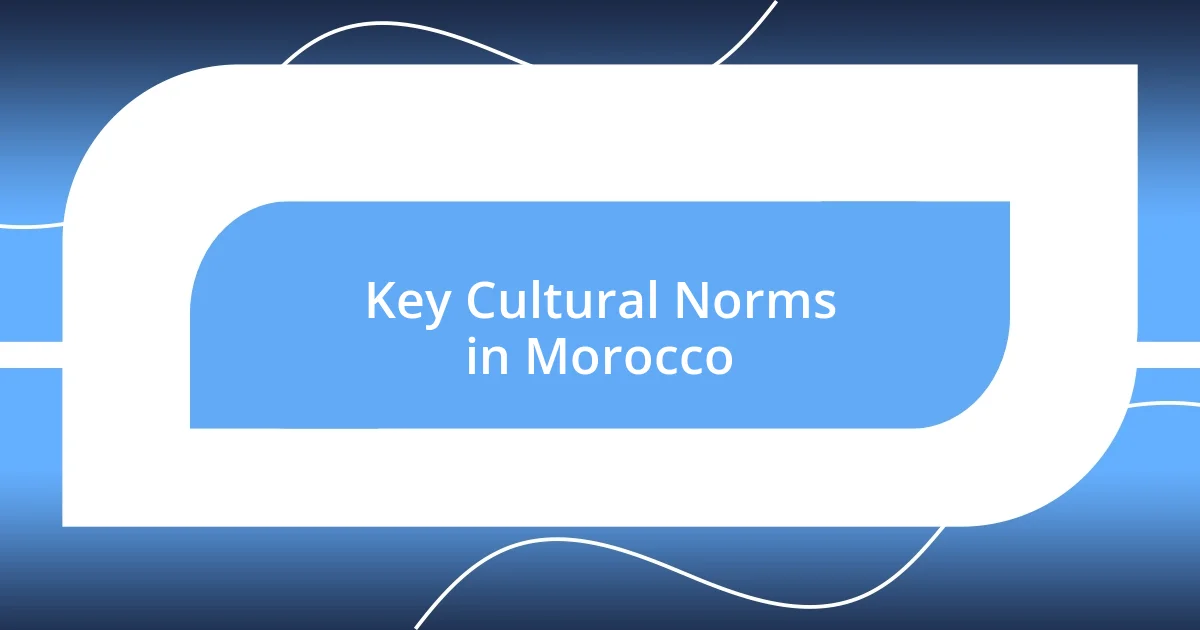
Key Cultural Norms in Morocco
Moroccan culture is deeply rooted in respect for tradition and social etiquette. One significant norm I encountered was the importance of greeting individuals properly. I learned that a warm handshake, often accompanied by inquiries about your well-being, is essential when meeting someone for the first time. Reflecting on my experiences, I found that a simple ‘Salam Alaikum’ often led to richer and more meaningful conversations. It was a small yet vital way to honor the local customs.
Another key aspect of Moroccan life is the emphasis on hospitality, extending far beyond mere politeness. I remember being invited for mint tea in a riad, where the host took time to explain the delicate process of brewing. Sharing tea is a ritual, symbolizing friendship and respect. In that cozy space, I realized that hospitality isn’t about the quantity of food or drink but the intention behind sharing it—a lesson I carry with me even today.
In Moroccan culture, family and community take precedence over individualism. I once attended a wedding where the entire neighborhood participated in the celebrations. The joyous atmosphere felt infectious, reminding me how deeply connected everyone was. Moments like these not only shattered any preconceived notions I had but also reinforced a vital lesson: true connection flourishes in communal joy, where it becomes evident that we are all part of something far larger than ourselves.
| Cultural Norm | Description |
|---|---|
| Greetings | Warm handshakes and inquiries about well-being are vital in Moroccan society. |
| Hospitality | Inviting guests for mint tea symbolizes friendship and respect. |
| Community Focus | Family and community play a central role, as seen during communal celebrations like weddings. |
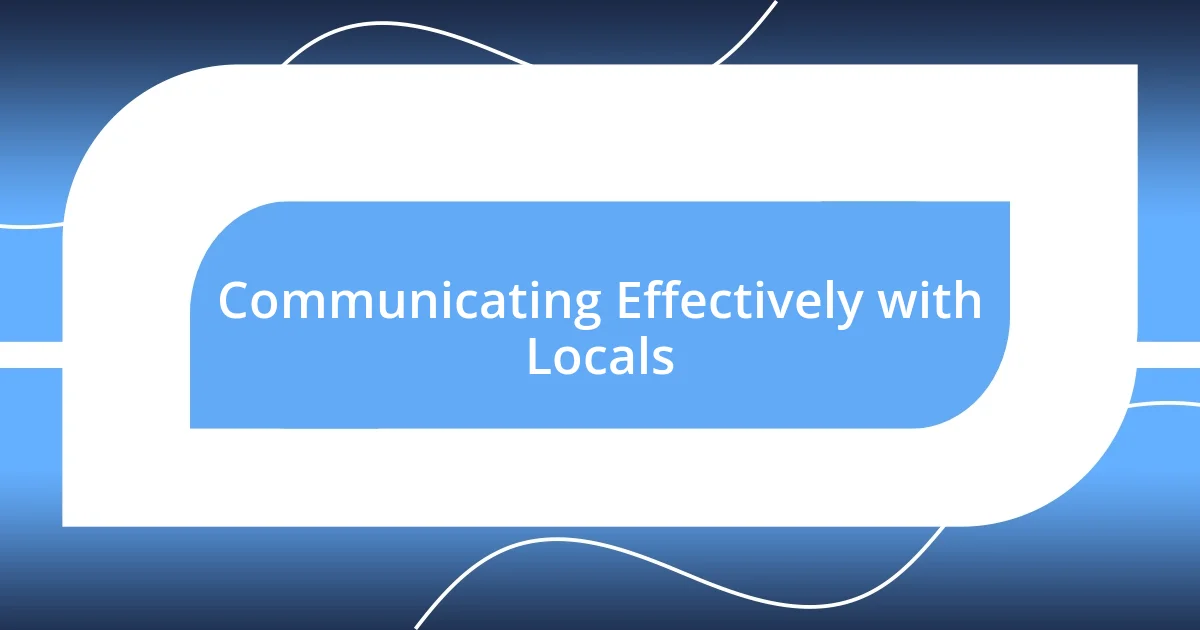
Communicating Effectively with Locals
When it comes to communicating with locals in Morocco, I found that body language speaks volumes. A smile, for instance, is universal; it can transform a tense moment into a friendly exchange. I recall standing in a bustling souk, feeling overwhelmed by the sights and sounds. As I smiled and gestured, shopkeepers responded positively, and suddenly, I was part of the vibrant tapestry around me. Have you ever noticed how a simple expression can change your whole experience?
Engaging in conversation also involves being mindful of the pace and tone of your words. In Morocco, I learned that patience is a virtue; rushing through dialogues can come off as disrespectful. One evening, while chatting with a local artisan, I had to remind myself to slow down and listen intently. The art of pausing not only opened up deeper conversations but also revealed stories that enriched my understanding of Moroccan culture. Isn’t it interesting how slowing down can lead to more meaningful connections?
Finally, I found that embracing humor was a great bridge when navigating cultural differences. One day, as I attempted to haggle for a beautiful piece of pottery, my halting Arabic caused both of us to chuckle. That laughter broke the ice, creating an atmosphere of camaraderie. I realized that when you can share a laugh despite differences, you’re building a connection that transcends language—a humor that feels like a warm embrace, don’t you think?
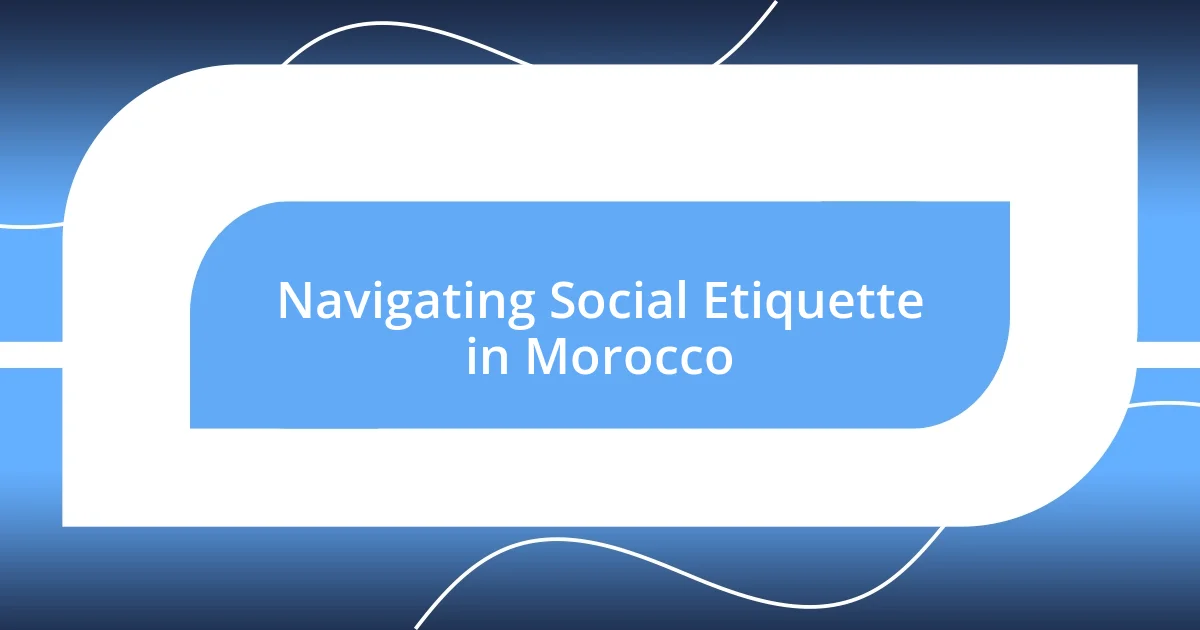
Navigating Social Etiquette in Morocco
Engaging in social etiquette in Morocco was eye-opening for me. I remember sitting down with a group of locals, and before anything else, we spent several minutes exchanging pleasantries. It felt like a dance—each inquiry about family or health was met with a genuine smile. This simple ritual significantly deepened our interaction. Did you know that this practice is not just politeness but a vital part of establishing a trustworthy relationship?
Another memorable moment occurred during a local family’s iftar meal during Ramadan. I was invited to join, and as I entered their home, I was met with a heartfelt welcome that made me feel like part of their family. The emphasis on sharing dishes and inviting guests to eat first showed an unspoken respect and care for each other’s comfort. In that moment, I truly understood how important it is to honor the roles we play in each other’s lives. Did you ever notice how food can bridge gaps and create unexpected bonds?
It’s also crucial to be aware of the nuances in gift-giving and receiving. When presenting gifts, I learned it’s common to use your right hand, as the left is considered impolite for such gestures. I recall giving a small token to my host, and the moment their hands touched mine, it symbolized a silent agreement of respect and appreciation. Isn’t it fascinating how small actions can speak volumes in a different culture?
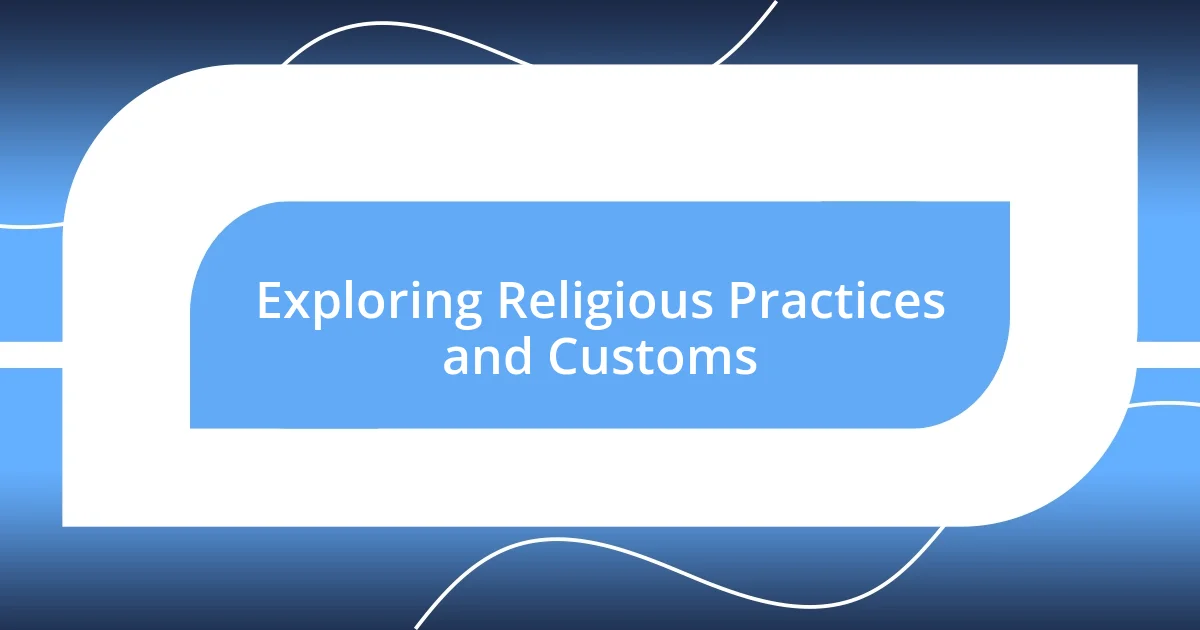
Exploring Religious Practices and Customs
Exploring the religious practices in Morocco opened my eyes to a world where faith deeply intertwines with daily life. One evening during Ramadan, I had the privilege of joining locals for iftar, the meal that breaks the fast. The atmosphere was electric with anticipation, and as we came together, I felt an overwhelming sense of community and shared joy. Have you ever experienced a gathering that felt like a warm embrace, no matter your background?
Attending Friday prayers at a local mosque provided me with a fascinating insight into the spiritual rhythm of Moroccan life. I remember walking into the mosque, feeling both nervous and honored. The simplicity and solemnity of the rituals swept me away. Watching the congregation move in unison during prayer was not only visually mesmerizing but also emotionally stirring. It made me ponder: how does one experience unity in diversity?
Customs surrounding religious festivals, like Eid al-Fitr, were equally captivating. I vividly recall the exuberance in the streets, with families decorating their homes and sharing sweet treats with neighbors. Being invited to partake in the celebrations was both an honor and a delight. This experience made me reflect on the importance of community and generosity in Moroccan culture. Isn’t it amazing how shared festivities can weave a tapestry of connection, transcending individual differences?
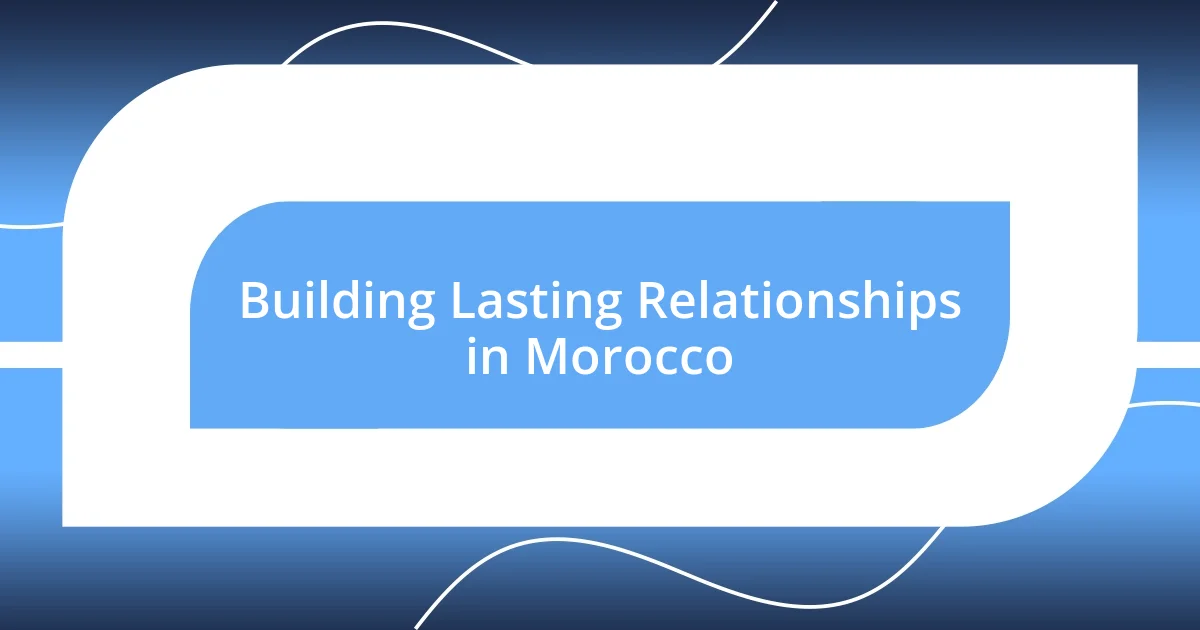
Building Lasting Relationships in Morocco
Building lasting relationships in Morocco often revolves around shared experiences and genuine hospitality. One afternoon, I found myself in a bustling souk, marveling at the vibrant colors and lively chatter. A local vendor caught my attention and struck up a conversation. Instead of merely selling his wares, he invited me to sit and enjoy a cup of mint tea. As we chatted, I realized that his warm hospitality transformed our interaction from a simple transaction into a budding friendship. How often do we overlook the power of sitting down with someone to uncover shared stories?
It’s also essential to recognize how trust is deeply woven into Moroccan friendships. I recall an incident where a colleague and I were navigating a project together. Instead of simply exchanging emails, he proposed we meet over lunch. During that meal, we talked about our visions, but we also shared personal anecdotes, and in that relaxed setting, a bond was forged. This made me think: isn’t it interesting how breaking bread can foster a stronger sense of connection in business and friendship alike?
Lastly, I’ve learned that creating lasting relationships in Morocco often requires a level of openness and authenticity. Once, I was invited to a family gathering where I felt a bit out of my element. However, once I openly shared my own cultural background and experiences, the warmth of their acceptance washed over me like a comforting blanket. I realized that vulnerability can truly pave the way for deeper connections. Have you ever experienced how simply sharing your story can invite others to share theirs, too?






